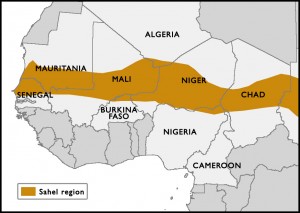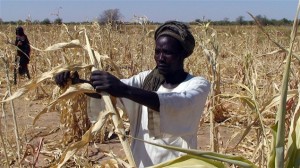Improving Food Security in Africa – Women Are the Answer
Aug 2nd, 2013 | By admin | Category: Food and Hunger/AgricultureBy Suzanne York, www.howmany.org
The headlines out of the Sahel region of Africa (and Sub-Saharan Africa) are not good, and are reflective of climate change, food insecurity, and poverty. The situation highlights the need to invest in and empower women as one answer to these problems.
The Food & Agriculture Organization’s (FAO) Situation Update on the Sahel reported last month that approximately 10.3 million people are food insecure and over 1.4 million children are at risk of severe acute malnutrition. UNICEF and other organizations are warning that the prolonged drought in the region is reducing food output, raising prices basic foods, and increasing child malnutrition.
The FAO noted that “In a context of widespread poverty, high population growth, malnutrition, chronic vulnerability and high food prices, recurrent crises have eroded the coping capacity and weakened the livelihoods of already vulnerable people.”
A new report by Refugees International said that frequent droughts and unsteady rainfall are pushing families out of the Sahel. Most of the region’s 100 million inhabitants rely on seasonal rainfall to rejuvenate farmland and produce feed for their herds.
The news is disturbing, yet there are solutions, and they involve empowering women.
In 3 Unexpected Ways to Improve Food Security in Sub-Saharan Africa, the World Resources Institute lists the following as some key approaches to ease food insecurity:
- Increase educational opportunities for girls. In general, the longer girls stay in school, the later they start bearing children, and the fewer children they ultimately have. But for Sub-Saharan Africa, the region has a low share of women with lower secondary education, but a large share of high birth rates.
- Increase access to reproductive health services, including family planning. Access to family planning counseling and technology ensures that women and men can make informed choices about reproduction. Millions of women want to space and limit their births, but do not have adequate access to reproductive health services. According to the World Health Organization, 53 percent of women in Africa who wish to control their fertility lack access to birth control.
- Reduce infant and child mortality. Reducing infant and child mortality assures parents that they do not need to conceive a high number of children in order to assure survival of a desired number. Reducing infant and child mortality comes from better health care, sanitation, and food.
Lester Brown of the Earth Policy Institute agrees. The long-time environmentalist believes that the best way to reduce world hunger is to “make sure women everywhere have access to reproductive healthcare and family planning services.”
And not to be left out is improving equality and how that relates back to providing for families. The FAO’s State of the Food and Agriculture report 2011 stated that “If women had the same access to productive resources as men, they could increase yields on their farms by 20–30 percent.”
Food security exists when all people, at all times, have physical and economic access to sufficient, safe and nutritious food to meet their dietary needs and food preferences for an active and healthy life. And women are empowered when their reproductive rights and gender are respected, they have access to education and healthcare, and they find sustainable economic livelihoods.
When women’s rights, education, health, and family planning are prioritized, people and communities become stronger and can better handle and adapt to environmental and social problems. But with the impacts of climate change becoming increasingly severe the world over, the time to act is now.
Indeed, time is of the essence. In the words of Lester Brown, “Of all the resources we have, time is the scarcest.”
Suzanne York is a senior writer with the Institute for Population Studies.
[photo credit: www.radio-canada.ca ]


